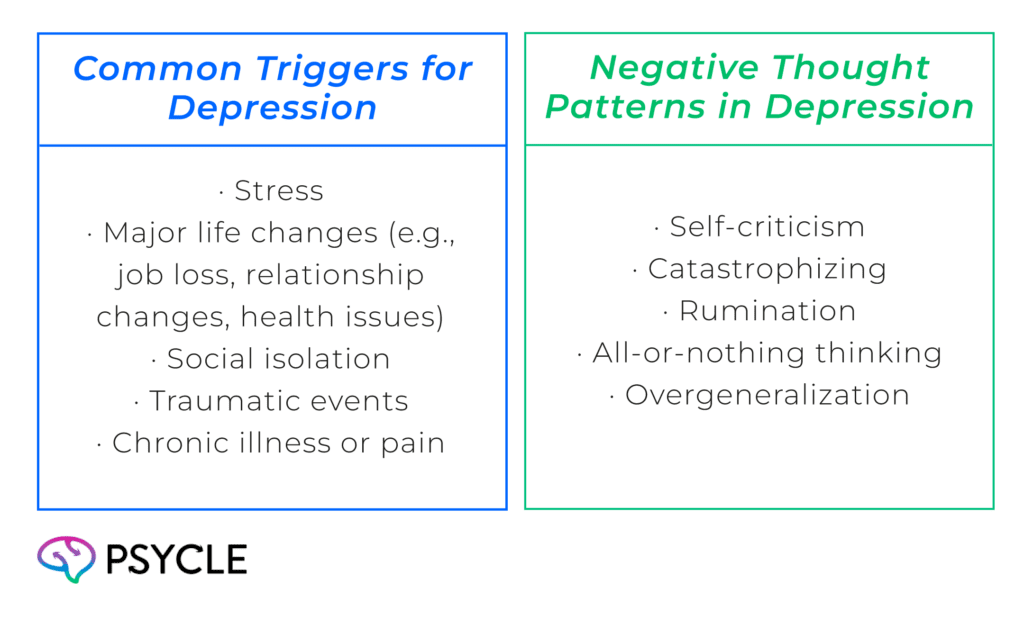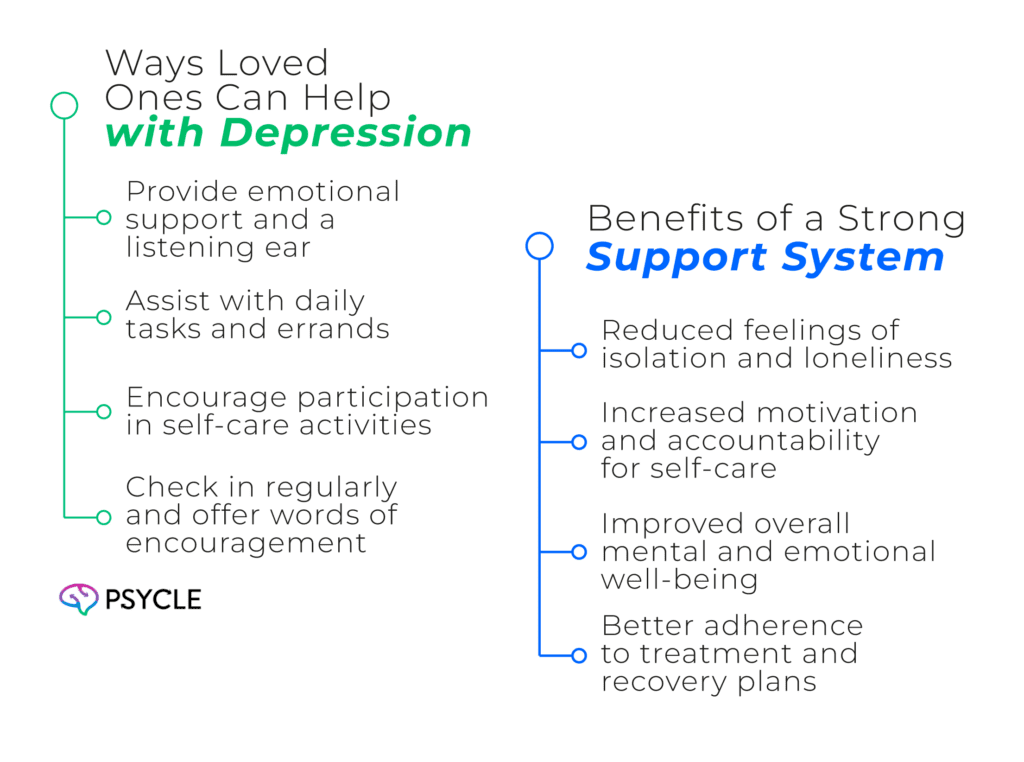Overcoming depression is a tough but crucial journey. This guide will show you how to escape depression’s hold and take back your life. You’ll learn about the causes, triggers, and effective strategies to fight depression.
By creating a plan tailored to you, you can break the depression cycle. This guide is for those dealing with persistent depression. It offers expert advice and tools for lasting change.
Key Takeaways
- Understand the root causes and risk factors of depression to develop a targeted approach.
- Identify negative thought patterns and triggers that contribute to the depression cycle.
- Implement lifestyle changes and self-care practices to improve mental health.
- Seek professional help and utilize therapy to break the cycle of depression.
- Build a supportive network and cultivate resilience to prevent relapse.
Understanding Persistent Depressive Disorder
Persistent depressive disorder, also known as dysthymia, is a long-lasting and milder form of depression. It can greatly affect a person’s quality of life. Though it’s not as severe as major depressive disorder, it’s hard to manage and can cause serious problems if not treated.
Symptoms and Causes
The main symptoms include feeling sad, having low energy, trouble concentrating, and feeling unhappy with life. These feelings are present most of the day, for many days, and last at least two years in adults or one year in kids and teens.
The causes of persistent depressive disorder are complex. They involve biological, social, and psychological factors. Genetic predisposition, traumatic events, and other mental health issues can play a role.
Risk Factors and Complications
People with a family history of depression, those who have faced big life stressors or trauma, and those with other mental health conditions are at higher risk. If not treated, persistent depressive disorder can lead to problems in relationships, work, and even increase the risk of suicide.
It’s important to recognize and address the symptoms of persistent depressive disorder. Understanding this condition helps individuals seek the right treatment and support. This can help break the cycle of chronic depression.
Identifying Triggers and Negative Thought Patterns
To break the cycle of depression, it’s key to know the common triggers and negative thoughts that keep it going. Triggers for depression include stress, big life changes, and feeling alone. These can make depressive symptoms worse.
Negative thoughts like self-criticism, always seeing the worst, and thinking too much about the same thing can trap you. By spotting these patterns, you can start to understand depression triggers better. This helps you find ways to handle them, leading to breaking the cycle of negative thinking.

By knowing how triggers and negative thoughts play a part in depression, you can start to change. This is the first step towards better mental health.
Lifestyle Changes for Better Mental Health
Overcoming depression is a journey that needs a mix of approaches. One important step is making lifestyle changes that boost your mental health. Regular exercise, a balanced diet, and good sleep are key to a healthy lifestyle.
Physical activity, like walking or yoga, releases endorphins and helps your mood. Eating a diet rich in whole foods and avoiding processed foods is also good for your mind. Getting 7 to 9 hours of sleep each night can greatly help manage depression.
Incorporating Mindfulness and Self-Care Practices
Dealing with depression can feel overwhelming. But, using mindfulness-based interventions and a full self-care plan can help a lot. Mindfulness helps us stay in the moment, be kind to ourselves, and handle tough thoughts and feelings better.
Mindfulness Techniques for Depression
Mindfulness makes us more aware of our thoughts and feelings. It stops us from getting lost in worries or negative thoughts. Simple practices like meditation and focusing on our breath can keep us present.
- Mindful meditation: Just a few minutes each day can calm our minds and bring peace.
- Breathing exercises: Deep, slow breaths can calm our body’s stress response.
- Body awareness: Paying attention to our body’s sensations helps us accept and care for ourselves.
Adding these self-care practices for depression to our daily lives can change everything. It can help us break the depression cycle and improve our overall health.
Building a Support System
Having a network of caring people can offer the emotional, practical, and social support you need as you work to overcome depression. This support is crucial for managing mental health recovery.
Leaning on Loved Ones
Family, close friends, and community members are vital in how loved ones can help with depression. They can listen, offer encouragement, and help with daily tasks when you’re feeling down.
- Share your feelings openly and honestly with your loved ones. Let them know how they can best support you.
- Accept offers of practical assistance, such as help with chores, errands, or transportation.
- Participate in social activities and maintain regular contact with your support network, even when it’s difficult.
Having a sense of belonging and people you can rely on is crucial for your mental health. You don’t have to battle depression alone. Let your loved ones join you on your journey to healing and recovery.

Setting Achievable Goals and Celebrating Progress
Setting realistic goals is key to beating depression. When we aim for goals that match our values and dreams, we find purpose and motivation. Goal-setting for depression helps us take charge of our recovery, boosting our confidence and self-worth.
It’s also crucial to celebrate our small victories. Recognizing these achievements boosts our self-confidence and keeps us moving forward. The importance of progress-tracking in depression management is huge. It helps us see how far we’ve come and guides us in making better choices.
- Set Specific, Measurable, and Time-Bound Goals: Make goals clear, measurable, and with a deadline. For example, aim to exercise for 30 minutes, three times a week, or practice mindfulness every day.
- Celebrate Incremental Victories: Acknowledge and celebrate every small step. This could mean doing something you love, sharing your success with friends, or just reflecting on your progress.
- Regularly Review and Adjust Goals: Check your goals often to make sure they still fit your needs and abilities. Feel free to change or add new goals as you grow. By setting goals and celebrating small wins in depression recovery, we build a sense of progress and confidence. The importance of progress-tracking in depression management is huge. It lets us see our growth and make better choices for our recovery.
Managing Setbacks and Preventing Relapse
It’s important to have coping strategies to manage setbacks and prevent relapse with depression. These strategies help you get through tough days and keep moving forward in your recovery.
Coping Strategies for Tough Days
When you hit a rough patch, having a set of strategies can be a lifesaver. Here are some effective ways to cope:
- Practice self-care activities, such as taking a relaxing bath, going for a walk, or engaging in a hobby you enjoy.
- Seek support from your loved ones, whether it’s talking to a trusted friend or family member, or joining a support group.
- Incorporate mindfulness techniques, like deep breathing exercises or meditation, to help ground you in the present moment.
- Break down large tasks into smaller, manageable steps to avoid feeling overwhelmed.
- Remind yourself of your past successes and progress, and celebrate even the smallest victories.
Remember, setbacks are a normal part of the recovery process. With the right strategies, you can get through them and avoid relapse in depression. Be kind to yourself, and don’t hesitate to seek additional professional help if needed.
Nurturing Resilience and Hope
Beating depression is more than just managing symptoms. It’s about building resilience and hope. Building resilience in depression is key to breaking the cycle and taking back control of your mental health.
Resilience lets you adapt and bounce back from tough times. It’s a strong tool in fighting depression. By nurturing resilience, you can develop the strength to handle the ups and downs of recovery. This helps you break the depression cycle and keep your mental health strong over time.
Hope is just as important as resilience in depression recovery. It gives you the motivation to keep going, even when things get tough. By believing in your ability to heal, you can find the courage to move forward and improve your well-being.
By building resilience and hope, you can overcome challenges. This leads to long-term mental wellness and a better life.
Seeking Professional Help
Sometimes you need professional help to beat depression. Talking to a mental health professional, like a therapist, can offer the support and tools you need.
Therapy helps find the root causes of depression and teaches coping strategies. It also teaches skills to manage symptoms. Sometimes, a doctor may suggest medication as part of the treatment plan.
By using a holistic approach that includes lifestyle changes and professional help, you can make significant progress. This can help you break the cycle of depression and improve your mental health.
The Role of Therapy and Support Groups
Breaking the cycle of depression often requires a multifaceted approach. Therapy and support groups play a crucial role in this process. Cognitive-behavioral therapy and interpersonal therapy are two effective approaches. They help individuals identify and challenge negative thought patterns that contribute to depression.
Through cognitive-behavioral therapy, individuals learn to recognize and reframe their distorted thoughts. They develop healthier coping strategies and improve their overall well-being. Interpersonal therapy focuses on addressing interpersonal issues that may contribute to depression. This includes communication problems or relationship conflicts.
Support groups also offer a valuable resource for those struggling with depression. These groups provide a safe and supportive environment. Here, individuals can share their experiences, find empathy, and learn from others who have walked a similar path.
- Connecting with others who understand the challenges of depression can reduce feelings of isolation and provide a sense of community.
- Sharing coping mechanisms and exploring different approaches to managing depression can inspire hope and empower individuals to take an active role in their recovery.
- The benefits of therapy and support groups extend beyond just treating the symptoms of depression. They also help individuals build resilience, develop self-awareness, and cultivate a more positive outlook on life.
By incorporating both therapy for depression and support groups for depression into their treatment plan, individuals can start to heal. They can take meaningful steps towards lasting well-being.
Conclusion
The journey to break depression’s cycle may seem tough, but it’s possible. With determination and the right steps, a better future awaits. Understanding depression’s causes, spotting triggers, and changing your lifestyle can help.
Overcoming depression requires a few important steps. Mindfulness, a strong support network, and setting goals are crucial. It’s also vital to seek professional help and stay ready for challenges ahead.
Recovery is a journey with ups and downs. But with each step, the path to a brighter future grows clearer. By focusing on resilience and hope, you can overcome depression and start living again, day by day.
FAQs
What is Persistent Depressive Disorder (Dysthymia)?
Persistent depressive disorder, or dysthymia, is a long-lasting, milder depression. It affects a person’s quality of life. It includes feeling sad, low energy, and trouble concentrating.
What are the Common Triggers for Depression?
Depression can be triggered by stress, big life changes, and feeling isolated. Knowing these triggers and negative thoughts is key to overcoming depression.
How Can Lifestyle Changes Help Break the Cycle of Depression?
Healthy habits like exercise, balanced diet, and regular sleep can improve mood.
Source Links
- https://www.hopkinsmedicine.org/health/conditions-and-diseases/dysthymia
- https://www.mayoclinic.org/diseases-conditions/persistent-depressive-disorder/symptoms-causes/syc-20350929
- https://www.mayoclinic.org/diseases-conditions/depression/symptoms-causes/syc-20356007
- https://www.apa.org/ptsd-guideline/patients-and-families/finding-good-therapist
- https://psychcentral.com/depression/how-does-mindfulness-reduce-depression
- https://mywellbeing.com/therapy-101/how-to-build-a-support-system

